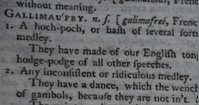Gallimaufry
 Dr Johnson defined gallimaufry as
Dr Johnson defined gallimaufry as
1. A hoch-poch …
2. Any inconsistent or ridiculous medley. …
Here’s another hoch-poch, or hotch-potch (though, of course, not a hotchpot) of links relevant to the themes of this blog that have caught my eye over the last while, including: unjust enrichment, research integrity, breach of contract, slavery, good samaritans, and privacy. …

 However, one citation system stands out, and this is one situation where you really can judge a book by its cover: the Standard System of American Legal Citation is universally called
However, one citation system stands out, and this is one situation where you really can judge a book by its cover: the Standard System of American Legal Citation is universally called 